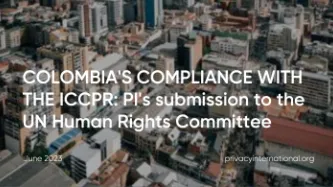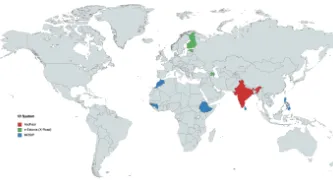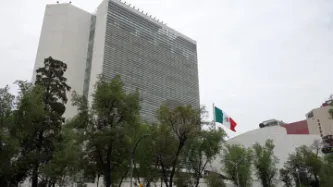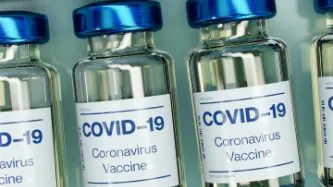Search
Content type: Advocacy
In the wake of Privacy International’s (PI) campaign against the unfettered use of Facial Recognition Technology in the UK, MPs gave inadequate responses to concerns raised by members of the public about the roll-out of this pernicious mass-surveillance technology in public spaces. Their responses also sidestep calls on them to take action.The UK is sleepwalking towards the end of privacy in public. The spread of insidious Facial Recognition Technology (FRT) in public spaces across the country…
Content type: Advocacy
Dejusticia, Fundación Karisma, and Privacy International submitted a joint stakeholder report on Colombia to the 44th session of the Universal Periodic Review at the UN Human Rights Council.Our submission raised concerns regarding the protection of the rights to freedom of expression and opinion, to privacy, and to personal data protection; the shutdown of civil society spaces; protection of the right to protest; and protection of the rights of the Venezuelan migrant and refugee population.…
Content type: Advocacy
In June 2023, we made a submission to the Human Rights Committee ahead of its 138th Session in relation to Colombia’s compliance with the International Covenant on Civil and Political Rights (ICCPR).
We called on the UN Human Rights Committee to make the following recommendations to Colombia:
The Electoral Law should ensure that the electoral register does not include personal data other than what is required to establish eligibility to vote. The law should define the minimum…
Content type: Advocacy
We, the undersigned civil society organizations and individuals, urge the World Bank and other international organizations to take immediate steps to cease activities that promote harmful models of digital identification systems (digital ID).
The signatories of this letter are located in different countries, work with diverse communities, and bring a wide range of expertise. Among this group, there are many shared concerns and similar experiences documenting the harmful impacts…
Content type: Advocacy
Read in English
Nosotros, las organizaciones de la sociedad civil y los individuos abajo firmantes, instamos al Banco Mundial y a otras organizaciones internacionales a que tomen medidas inmediatas para cesar las actividades que promueven modelos perjudiciales de sistemas de identificación digital (ID digital).
Los firmantes de esta carta se encuentran en diferentes países, trabajan con diversas comunidades y aportan una amplia gama de conocimientos. Entre este grupo, hay muchas…
Content type: Long Read
Governments around the world are increasingly making registration in national digital ID systems mandatory for populations, justifying its need on a range of issues from facilitating access to services, to national security and fighting against corruption. This is an attempt to create a "foundational identity" for an individual, or "a single source of truth" about who someone is, according to a government agency. These identity systems are run by governments, sometimes by private companies, or…
Content type: Advocacy
Some of the most vulnerable groups in Mexico are amongst the groups at risk from a draft General Population Law that creates a biometric “Unique Digital Identity Card” (CUID), argue civil society organisations. The proposed law has now reached the senate, and has raised serious concerns from civil society organisations. Led by our global partner in Mexico Red en Defensa de los Derechos Digitales (R3D), PI along with 25 organisations have signed a joint letter to the members of the senate,…
Content type: News & Analysis
After almost 20 years of presence of the Allied Forces in Afghanistan, the United States and the Taliban signed an agreement in February 2020 on the withdrawal of international forces from Afghanistan by May 2021. A few weeks before the final US troops were due to leave Afghanistan, the Taliban had already taken control of various main cities. They took over the capital, Kabul, on 15 August 2021, and on the same day the President of Afghanistan left the country.As seen before with regime…
Content type: Advocacy
On 6 August 2021, the World Health Organisation (WHO) published its technical specifications and implementation guidance for “Digital Documentation of COVID-19 Certificates: Vaccination Status” (DDCC:VS) following months of consultations. As governments around the world are deploying their own Covid-19 certificates, guidance from the global health agency was expected to set a global approach, and one that prioritises public health. As such, we would expect the WHO to identify what these…
Content type: Long Read
This report is available in English.
La mayoría de los documentos nacionales de identidad y demás documentos emitidos por autoridades estatales incluyen un marcador de género. Estos marcadores suelen recibir el nombre de “marcador de sexo” aunque este término no sea preciso. La presencia de dichos marcadores, especialmente en los certificados de nacimiento, promueve el énfasis de nuestra sociedad en el género como criterio de asignación de identidades, roles y responsabilidades sociales. Al…
Content type: Long Read
Este informe está disponible en español.
Most national ID or identifying documents include a gender marker. This is often known as a 'sex marker,' even though the term is inaccurate. The presence of such markers, especially on birth certificates, contribute to our society’s emphasis on gender as a criterion for assigning identities, roles and responsibilities within society. With gender being such a determining and dominant identifier, it puts it at the centre of so many arrays of our…
Content type: Long Read
As we see Covid-19 vaccination programmes beginning around the world, for the first time since the start of the pandemic there seems to be a light at the end of the tunnel as the fruition of truly unrivalled global scientific efforts has given us hope of saving lives, reopening our societies, and going back to “normal”.
This great moment of hope must not be seen opportunistically as yet another data grab. The deployment of vaccines, and in particular any “immunity passport” or certificate…
Content type: Report
A common theme of all major pieces of national jurisprudence analyzing the rights implications of national identity system is an analysis of the systems’ impacts on the right to privacy.
The use of any data by the State including the implementation of an ID system must be done against this backdrop with respect for all fundamental human rights. The collection of data to be used in the system and the storage of data can each independently implicate privacy rights and involve overlapping and…
Content type: Explainer
In the name of reinforcing migration control and increasing security, the EU is introducing a host of new surveillance measures aimed at short-term visitors to the Schengen area. New tools and technologies being introduced as part of the visa application process and the incoming “travel authorisation” requirement include automated profiling systems, a ‘pre-crime’ watchlist, and the automated cross-checking of numerous national, European and international databases. There are significant risks…
Content type: Case Study
In Peru, you get asked for your fingerprint and your ID constantly - when you’re getting a new phone line installed or depositing money in your bank account – and every Peruvian person has an ID card, and is included in the National Registry of Identity – a huge database designed to prove that everyone is who they say they are. After all, you can change your name, but not your fingerprint.
However, in 2019 the National Police of Peru uncovered a criminal operation that was doing just that:…
Content type: News & Analysis
Unlikely as it may seem, the UN institution that has one of the greatest potential to impact upon people’s rights around the world is now the UN Statistics Division. And why is that?
Last week, they had a crucial meeting where they endorsed the UN’s Legal Identity Agenda and the UN’s Legal Identity Task Force. The stakes could hardly be higher. One of the UN’s Sustainable Development Goals, SDG 16.9, states that “by 2030 provide legal identity for all including free birth…
Content type: Advocacy
TEDIC, InternetLab, Derechos Digitales, la Fundación Karisma, Dejusticia, la Asociación por los Derechos Civiles y Privacy International acogen el llamado de la Relatoría Especial sobre Derechos Económicos, Sociales, Culturales y Ambientales (DESCA) de la Comisión Interamericana de Derechos Humanos (CIDH) de enviar información para la elaboración del Informe Anual sobre DESCA del año 2019, que se presentará ante la Organización de los Estados Americanos (OEA) en 2020.
El objeto de este…
Content type: Advocacy
TEDIC, InternetLab, Derechos Digitales, Fundación Karisma, Dejusticia, Asociación por los Derechos Civiles and Privacy International welcome the call made by the Special Rapporteurship on Economic, Social, Cultural and Environmental Rights (ESCER) of the Inter-American Commission on Human Rights (IACHR) to inform the preparation of the Annual Report of the ESCER for the year 2019, which will be presented to the Organization of American States (OAS) during 2020.
This submission aims to outline…
Content type: Long Read
It was a quiet evening in Agadez, a bustling Saharan city in the centre of Niger. Thirty-five year old Agali Ahmed was sipping tea at a friend’s place, as he often did, when he received a message: police were at his uncle’s house. When he got there, Ahmed saw men in plainclothes, standing around the building’s gate. Inside, more men were searching the apartment. Three white men, who Ahmed guessed were Spanish, asked for his phone and started taking pictures of him. They told him to follow them…
Content type: Long Read
[Photo credit: Images Money]
The global counter-terrorism agenda is driven by a group of powerful governments and industry with a vested political and economic interest in pushing for security solutions that increasingly rely on surveillance technologies at the expenses of human rights.
To facilitate the adoption of these measures, a plethora of bodies, groups and networks of governments and other interested private stakeholders develop norms, standards and ‘good practices’ which often end up…
Content type: Long Read
Photo by Nadine Shaabana on Unsplash
Digital identity providers
Around the world, we are seeing the growth of digital IDs, and companies looking to offer ways for people to prove their identity online and off. The UK is no exception; indeed, the trade body for the UK tech industry is calling for the development of a “digital identity ecosystem”, with private companies providing a key role. Having a role for private companies in this sector is not necessarily a problem: after all, …
Content type: Long Read
Photo: Francesco Bellina
Driven by the need to never again allow organised mass murder of the type inflicted during the Second World War, the European Union has brought its citizens unprecedented levels of peace underpinned by fundamental rights and freedoms.
It plays an instrumental role in protecting people’s privacy around the world; its data protection regulation sets the bar globally, while its courts have been at the forefront of challenges to unlawful government surveillance…
Content type: News & Analysis
The Irish Data Protection Commissioner has made a ruling on the controversial Public Services Card (PSC) that has described much of what is is done with the card as unlawful. The PSC has proven controversial: introduced in 2012 for welfare claimants, it's use expanded to more and more uses, including its use to get a driving licence or passport. Now, following campaigns from civil liberties organisations, this expansion of use has now been found to be unlawful by Ireland's Data Protection…
Content type: Examples
After an 18-month investigation involving interviews with 160 life insurance companies, in January 2019 New York Financial Services, the state's top financial regulator, announced it would allow life insurers to use data from social media and other non-traditional sources to set premium rates for its customers. Insurers will be required to demonstrate that their use of the information doesn't unfairly discriminate against specific customers. New York is the first state to issue specific…
Content type: Examples
In February 2019, the World Food Programme, a United Nations aid agency, announced a five-year, $45 million partnership with the data analytics company Palantir. WFP, the world's largest humanitarian organisation focusing on hunger and food security, hoped that Palantir, better known for partnering with police and surveillance agencies, could help analyse large amounts of data to create new insights from the data WFP collects from the 90 million people in 80 countries to whom it distributes 3…
Content type: Long Read
Image credit: Emil Sjöblom [ShareAlike 2.0 Generic (CC BY-SA 2.0)]
Prepaid SIM card use and mandatory SIM card registration laws are especially widespread in countries in Africa: these two factors can allow for a more pervasive system of mass surveillance of people who can access prepaid SIM cards, as well as exclusion from important civic spaces, social networks, and education and health care for people who cannot.
Mandatory SIM card registration laws require that people provide personal…
Content type: Long Read
Photo By: Cpl. Joel Abshier
‘Biometrics’ describes the physiological and behavioural characteristics of individuals. This could be fingerprints, voice, face, retina and iris patterns, hand geometry, gait or DNA profiles. Because biometric data is particularly sensitive and revealing of individual’s characteristics and identity, it can be applied in a massive number of ways – and has the potential to be gravely abused.
Identification systems across the world increasingly rely on…
Content type: Long Read
The Privacy International Network is celebrating Data Privacy Week, where we’ll be talking about how trends in surveillance and data exploitation are increasingly affecting our right to privacy. Join the conversation on Twitter using #dataprivacyweek.
Innovations in surveillance and data exploitation present challenges in the fight to protect personal data across the world. Since 1990 we have been working to build a global movement through working with others - from leading civil society…
Content type: Long Read
The Privacy International Network is celebrating Data Privacy Week, where we’ll be talking about how trends in surveillance and data exploitation are increasingly affecting our right to privacy. Join the conversation on Twitter using #dataprivacyweek.
It is often communities who are already the most marginalised who are at risk because of the privacy invasions of data-intensive systems. Across the globe, we see the dangers of identity systems; the harms of online violence against women and the…
Content type: Long Read
Image attribution: By Legaleagle86 at en.wikipedia, CC BY-SA 3.0.
In a long-anticipated judgment, the Indian Supreme Court has ruled that India's controversial identification system Aadhaar is Constitutional. They based their conclusion on notes that there are sufficient measures in place to protect data, and that it is difficult to undertake surveillance of citizens on the basis of Aadhaar.
But there is some good in this ruling. The court has demanded that the Government introduce…

























